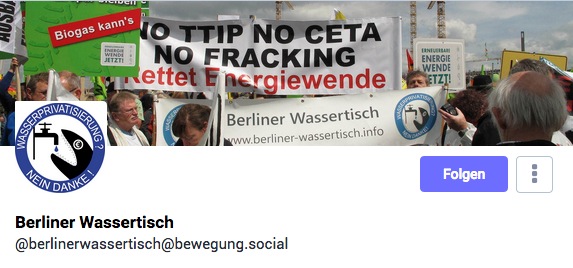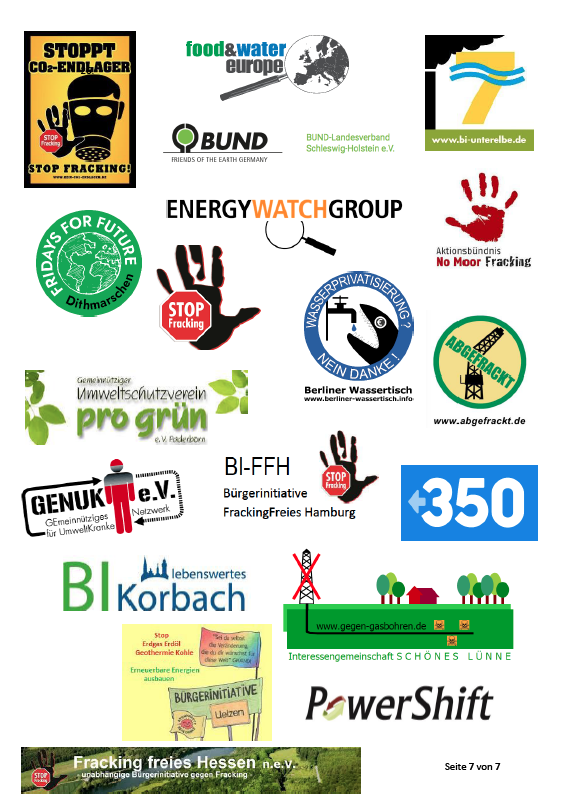Privatsphäre stärkt, Überwachung schwächt! #StopScanningMe


Suche

Schiefergas-Fracking in Deutschland?

#StopEUMercosur Erklärung

Aktion Greenpeace: #StopEUMercosur

#SaveTheOkavangoDelta
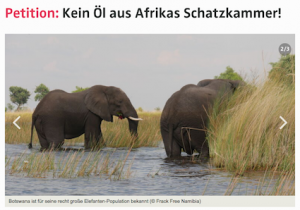
Erfolgreich! Über 1 Million Unterschriften „Green Deal“ – Europäische Bürgerinitiative (EBI)

Stop Energiecharta. #NoECT. Wir wollen raus aus dem Anti-Klimaschutz-Vertrag
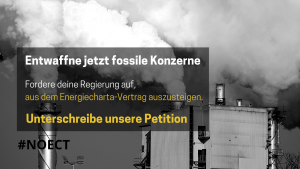
Europäische Bürgerinitiative gegen biometrische Massenüberwachung (17.2.2021-17.2.2022)

Lebensgefährliche Entwicklung: Gewinnorientierung im Krankenhaus
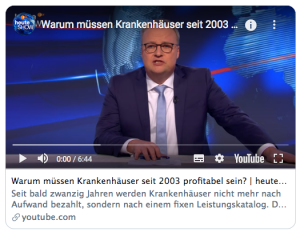
- Wassertisch-Plenum,
im NewYorck / Bethanien Mariannenplatz 2A
10997 Berlin Openstreetmap fällt coronabedingt aus Überblick (Messstellen: Oberflächengewässer und Grundwasser)


-
Letzte Beiträge
- AöW zum Weltwassertag 2023: Interkommunale Zusammenarbeit noch stärker ermöglichen
- Greenpeace: Fracking – eine unterirdisch schlechte Idee
- Bürgerinitiative gegen CO2-Endlager: Offener Brief an den Bundesminister für Wirtschaft und Klimaschutz Dr. Robert Habeck
- BUND gegen CCS-Endlager
- Jürgen Knirsch: CETA-Handelsabkommen: Eine trügerische Wette auf die Zukunft (Leserbrief an die SZ vom 8.12.2022)
- Neuere Materialien und Dokumente zur CETA-Debatte
- TAZ: Hamburger Abgeordneter über Olympia-Gedankenspiele: „Es kommt zu Vertreibungen“
- NDR: Bewirbt sich Hamburg noch einmal um Olympische Spiele?
- NGO-Bündnis fordert mit gemeinsamen Appell die Senkung des absoluten Ressourcenverbrauchs
- Allianz der öffentlichen Wasserwirtschaft warnt vor CETA: Mit dem jetzigen CETA-Text wird der Schutz der öffentlichen Wasserwirtschaft vor einer Kommerzialisierung weiter geschwächt

Delius-Klage

Keine Steuergelder für LNG-Fracking-Gas Terminals in Deutschland!
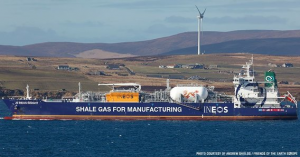
RSS-Feeds
Schlagwort-Archive: Biden
Offener Brief an die Biden-Regierung (USA): End U.S. Overseas Finance for Fossil Fuels
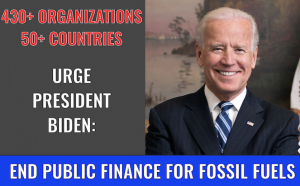
18. März 2021
To:
Secretary of the Treasury Janet Yellen
Secretary of State Anthony Blinken
Secretary of Energy Jennifer Granholm
Incoming President and Chairperson of the U.S. Export-Import Bank
Acting CEO of the U.S. International Development Finance Corporation Dev Jagadesan
Assistant to the President for National Security Affairs Jake Sullivan
Special Assistant to the President for Economic Policy Robin Colwell
Acting Chief Executive Officer, Millennium Challenge Corporation, Mahmoud Bah
Acting Director, U.S. Trade and Development Agency, Enoh T. Ebong
Special Presidential Envoy for Climate, John Kerry
We are encouraged by the Biden Administration’s initial steps to implement a ‘whole-of-government’ approach to the climate crisis, as set out in the January 27 “Executive Order on Tackling the Climate Crisis at Home and Abroad.” We are writing now to provide our recommendations on a critical piece of the international agenda described in the Executive Order — ending public support for fossil fuels around the world by “promoting the flow of capital toward climate-aligned investments and away from high-carbon investments.” We urge the Biden Administration to act swiftly to end new financing for all parts of the fossil fuel supply chain (including for gas), stop new U.S. fossil fuel support within 90 days across all government institutions, and work with other nations to end fossil fuel financing.[1]
As you know, averting the worst impacts of the climate crisis requires a rapid transition away from fossil fuels. There is simply no room left for new investments in long-lived carbon intensive infrastructure. Still, public agencies continue to provide tens of billions of dollars to finance and support such investments each year. This has to stop.
In his Executive Order, President Biden initiated three distinct inter-agency policy-making processes to address this problem.
- First, he directed Secretaries Yellen, Blinken, and Granholm to lead a process to develop a strategy to “promote ending international financing of carbon-intensive fossil fuel-based energy while simultaneously advancing sustainable development and a green recovery.”
- Second, he directed Secretaries Yellen and Blinken and Special Envoy Kerry to develop, in consultation with other relevant agencies, a “climate finance plan” that will focus on “promoting the flow of capital toward climate-aligned investments and away from high-carbon investments” within 90 days of the Executive Order.
- Third, he instructed Secretary Yellen to develop a strategy for the U.S. to use its voice and vote in international financial institutions to promote initiatives that are “aligned with and support the goals of the Paris Agreement.”
Each of these processes addresses an important part of the overall challenge of eliminating the flow of public money to fossil fuel infrastructure. The goal should be consistent across these processes: to articulate policies that are based on climate science, comprehensive in their scope — covering all institutions, all fossil fuels, and all stages in the value chain — and stringent in their requirements.
Background
Climate science shows that we need a rapid transition from fossil fuels, the single biggest source of global greenhouse gas emissions, to renewable energy in order to limit global warming to 1.5ºC. The IPCC’s P1 trajectory, which takes a precautionary approach to negative emission technologies, shows that the use of coal, oil and gas needs to drop by 78%, 37% and 25% respectively by 2030 compared to 2010 levels to keep warming limited to 1.5ºC. According to the 2020 UNEP Production Gap report, between 2020 and 2030, global coal, oil, and gas production would have to decline annually by 11%, 4%, and 3%, respectively, to be consistent with a 1.5ºC pathway. And in the electricity sector, there is no carbon budget left to build new gas and coal-fired power plants — many existing ones will need to be retired before the end of their normal economic lives. This means we should be focused on retiring fossil fuel infrastructure, and stop financing new infrastructure.
Despite the need to rapidly reduce fossil fuel production and use, G20 governments have provided more than three times as much in public finance for fossil fuels as for renewable energy every single year since the adoption of the Paris Agreement. U.S. institutions, such as the U.S. Export-Import Bank (EXIM) and the U.S. International Development Finance Corporation (DFC) (and its predecessor, the Overseas Private Investment Corporation) have provided billions for new fossil fuel projects annually, together averaging $4.4 billion per year over the past decade.
The good news is that by acting decisively, the Biden Administration can accelerate a global shift away from public finance for fossil fuels. The plan to end international public finance for fossil fuels that results from this Executive Order should be extensive — applying across the value chain for all oil, gas, and coal — and should apply to all U.S. international public finance across its bilateral institutions and its engagement in multilateral institutions. The plan should be implemented immediately to halt U.S public finance for fossil fuels.
Over the past 18 months, other leading governments and institutions have taken important steps to shift away from government-backed finance to the fossil fuel industry:
- In late 2019, the European Investment Bank — the world’s largest multilateral lender — passed a new Energy Lending Policy that will end virtually all its support for oil, gas, and coal by the end of this year. This month, its president pronounced “gas is over.”
- Late last year, the UK, holding the COP26 Presidency, announced “the UK will end taxpayer support for fossil fuel projects overseas as soon as possible,” including bilateral development finance, export finance, trade promotion, and UK MDB positions.
- On January 25, 2021, the European Council adopted new conclusions on energy and climate diplomacy, including that “European Union energy diplomacy will discourage all further investments into fossil fuel based energy infrastructure projects in third countries[…]” and a renewed call for “a global phase-out of environmentally harmful fossil-fuel subsidies along a clear timeline.”
This momentum builds on policy commitments to exclude finance for coal-fired power that the U.S. led under the Obama Administration, including through Treasury guidance, U.S. leadership at the MDBs and OECD, and through a 2013 joint commitment with other like-minded nations to end overseas coal finance that ultimately led to the Coal-Fired Electricity Generation Sector Understanding in the OECD Arrangement.
Recommendations
The Biden Administration can build on this momentum for curbing public finance for fossil fuels by pursuing a whole-of-government approach to end all U.S. public finance for fossil fuels, focusing instead on supporting climate action abroad. We, the undersigned, ask that the plans developed in accordance with the Executive Order to end international public financing of fossil fuels meet the following criteria:
Scope:
- Cover all U.S. public finance institutions, including the U.S. Export-Import Bank, U.S. International Development Finance Corporation, U.S. Trade and Development Agency, Millennium Challenge Corporation, United States Agency for International Development, and other relevant institutions. The plans should also apply to U.S. participation in multilateral institutions including the MDBs and the IMF.
- Include a strategy to partner with the UK, the EU, and other front-running countries to secure additional commitments from other governments and public finance institutions to end their public finance for fossil fuels, including at the OECD Export Credit Group and the second Finance in Common Summit.
- Apply across the oil, gas, and coal value chain (i.e., include upstream, midstream, and downstream segments), as well as for associated facilities and related infrastructure, and should apply to all funding streams and modalities, including indirect financing provided through financial intermediaries, and, in the case of the MDBs, development policy finance;
- Scale up international support for a just transition away from fossil fuels, providing support for workers and communities affected by the transition, for decommissioning and repurposing sites, and replacing fossil fuel with clean energy.
- Exclude new gas infrastructure from eligibility for all future government financing, except in extremely limited and well-defined, and closely regulated circumstances.[2] Gas is not a climate solution, nor is it a “bridge fuel.”[3] Rather, it diverts resources from less polluting, economically advantageous renewable, efficiency, storage, and other solutions that truly support decarbonization. Nor is the case for gas as a tool for energy access compelling. Recent research has shown that public finance for gas has seldom delivered significant energy access benefits, and alternatives are often more cost-effective. The UN Sustainable Energy for All initiative recently concluded that “financing of fossil fuel projects as a means of closing the energy access gap should be terminated” because it locks countries “into decades of carbon emissions, import dependency and stranded asset risk.”
Timeline:
- Develop plans for ending fossil fuel finance across all institutions as soon as possible, within the 90-day timeframe. While the Executive Order does not specify a deadline for Treasury to develop a strategy on the use of “voice and vote,” or a deadline for the specified agencies to articulate a plan to promote ending international financing of fossil fuel-based energy, we ask that strategies and implementation plans regarding “voice and vote” and international diplomacy also be completed within a 90-day timeframe, similar to what was specified for other areas such as the development of the “climate finance plan.”
- Clear Treasury guidance on the MDBs should be released as soon as possible in order to establish the U.S. position ahead of the Asian Development Bank’s forthcoming energy policy review, with a draft policy due to be released within weeks.
- Have all measures take effect soon after the completion of the plan; while also seeking comment on ways to strengthen the plans further.
- Conduct a public consultation process aimed at ensuring the outcome is as ambitious as possible.
Leadership on this agenda from the U.S. would have a considerable global impact. Thank you for your consideration of these recommendations, and we look forward to hearing from you.
[1] Nothing in this letter should suggest that the U.S. or other countries should end important bilateral support for programs seeking to improve transparency, accountability, and good governance of extractive industry operations globally or in specific country contexts; nor their support for similar critical programs carried out via multilateral institutions and initiatives.
[2] While the prospect is highly unlikely, very rare exceptions for fossil fuel projects intended solely for domestic energy consumption only in Least Developed Countries could be considered, but only after a thorough scenario analysis of all viable alternatives for meeting energy access demonstrates clear necessity and no viable alternatives.Such an assessment must consider price competitiveness over the full lifetime of the project from conception to full decommissioning, all costs of externalities, safety, and adherence to international best practices and environmental and social due diligence. Such conditions have not been demonstrated for any existing projects.
[3] The latest research on gas, particularly, U.S. LNG exports, demonstrates that lifecycle GHG emissions from gas are significantly worse than previously reported. Greenhouse gas emissions from U.S. LNG are just 27 to 33 percent lower than coal. Using more gas would not help countries meet even the modest emissions reduction targets required in the International Energy Agency’s Sustainable Development Scenario (a scenario that far exceeds a pathway that would limit warming to 1.5°C). This is true not only for using gas in Europe, but also for Japan, China and India. Over the lifetime of U.S. LNG projects, emissions will be significantly higher than clean investments such as solar, wind, storage, and efficiency measures. Lifecycle GHG emissions for solar power are less than 7 percent of LNG emissions; emissions for wind power are even lower, less than 2 percent of LNG emissions. We urge the administration to follow the latest science and exclude new gas infrastructure from eligibility for all future government financing.
Signed,
432 groups [darunter der Berliner Wassertisch] from 53 countries (listed below by region) weiterlesen
energiezukunft: Biden verhängt Moratorium für neue Öl- und Gas-Projekte
energiezukunft
28. Januar 2021
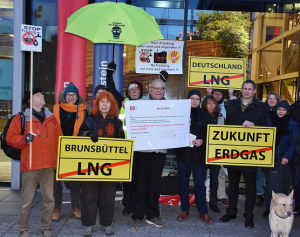
Biden verhängt Moratorium für neue Öl- und Gas-Projekte
„Gebiete in Staatsbesitz sollen vorerst nicht für neue Öl- und Gas-Projekte verpachtet werden, gibt US-Präsident Biden bekannt. Der Ausstieg aus fossiler Energie ist damit aber noch nicht eingeleitet. Auch Deutschland könnte weiter US-Gas importieren. […] Zerger [Leiter Energie und Klimaschutz bei der DUH] hätte sich ein strengeres allgemeines Fracking-Verbot von Joe Biden gewünscht.“
Zum Beitrag

 Pressemitteilungen
Pressemitteilungen